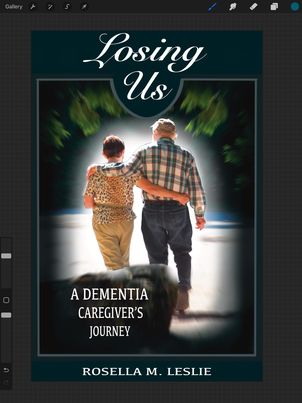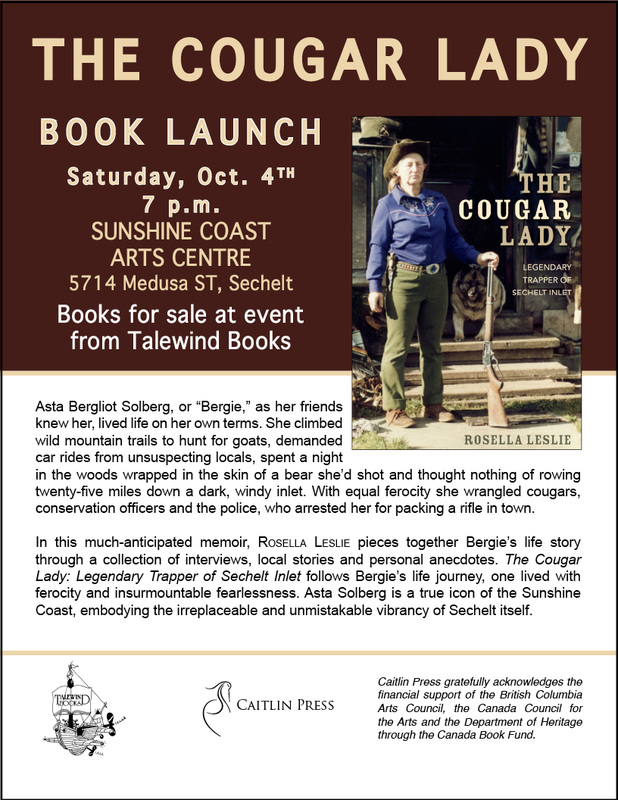My next stop is a talk at the Gibsons Public Library on March 11 from 2-3 pm. Hope to see you there!
|
Thanks to Marlene Cymbalist and Harboursides Friendships, a program funded by the Pender Harbour Health Centre Auxiliary, for hosting me to speak at their first in-person gathering since COVID. It was great to discover the amazing and friendly spirit of this community and to meet so many people interested in books and caring about the challenges faced by caregivers of persons with dementia.
My next stop is a talk at the Gibsons Public Library on March 11 from 2-3 pm. Hope to see you there!
1 Comment
Had a great turnout for my book launch. My thanks to the Sechelt Seniors Activity Centre for their support. I received many appreciative comments from attendees who found my talk helpful and informative. I am now hoping to present it in other communities to help even more caregivers find the services and supports they need to keep them healthy and resilient! If you know of a community that would benefit from my talk, please let me know. BOOK LAUNCH  2—5 PM NOVEMBER 3, 2022 SECHELT SENIORS ACTIVITY CENTRE 5604 TRAIL AVENUE SECHELT BC I will read from LOSING US and share some of the insights she developed along her journey as the caregiver of a person with dementia, including strategies that helped her to do a better job and at the same time to be kinder, healthier, and more resilient. DURING the twelve years that I was my husband John’s primary caregiver, I came to accept that she didn’t cause, couldn’t cure, and absolutely couldn’t control the dementia that attacked his brain. But in time I also found that what I could control was her own response to the impact this disease had on our lives. IN THIS MEMOIR, I reveal with honesty and compassion the guilt and shame I experienced for not being or doing enough for John, for my emotional outbursts and for wanting to escape what began to feel like a life-sentence in a rapidly shrinking prison. But much more than just a memoir of loss, Losing Us is an informal guide to dementia caregiving, providing links to caregiver resources and showing friends, families and the community what they can do to help. My insights demonstrate that dark thoughts and harsh feelings are not shortcomings but a natural response to being in an impossible situation, and she encourages caregivers to keep putting one foot in front of the other as they move toward the faint light of hope that shines at the end of this very dark tunnel. LOSING US is now available at: https://books.friesenpress.com/store/title/119734000268179085'and coming soon to Amazon, Barnes & Noble and e-book retail channels. Rosella Leslie was awarded Honourable Mention in the 2016 Prairie Fire Fiction Contest for her short story, "Stuck on a Rock." The story will be published in their summer edition. http://www.prairiefire.ca/contests/2011-contests/ The Koala Bear Writer has posted a great review of The Federov Legacy at:
https://www.facebook.com/therebelcircus/photos/a.519639714741404.1073741828.517549624950413/781367645235275/?&relevant_count=1 CARIBOO BOUND!
Good intentions are wonderful in theory but sometimes impossible to carry out. Thus, instead of writing my monthly blog, I am darting between researching the as-yet-unnamed novel I am writing and gathering photos for a biography I have written, The Cougar Lady: Legendary Trapper of Sechelt Inlet. The Cougar Lady is now in the production phase and will be available in the fall of 2014. Meanwhile, I am off to the Cariboo on June 2 for a week-long research trip and a book-signing at The Open Book in Williams Lake. Hope this gives me a chance to meet and talk with those of you who live in that beautiful country. However, in a musty cavern of my mind there is a vintage tale fermenting that will soon be ripe and ready for tasting. In a recent conversation with Anna Marie Tremonti on CBC’s The Current, New York publishing consultant Mike Shatzkin said, “. . . a lot of people who write books don’t [ really care about making money]. They care about writing and being read.”
For the record, while the passion to write and the determination to write well, is my guiding light, when it comes to my chosen profession I also care very much about “making money” because I need to support myself. In fact, I do not know any of my writing colleagues who do not care about “making money.” Many people love the work they do, but that doesn’t stop them from demanding—and getting—fair compensation for their efforts. Most writers work for two to three years on a book before it is sold to a publisher. After a year of editing and advance publicity, the book is placed on the market, and only after a full year of sales does the writer receive compensation. This is in the form of royalties—10-15% of book sales—and any advances that might have been received are deducted from these royalties. The stories and/or histories in my blogs are available to readers at no cost. I do this, not for an ego trip, but because I hope to encourage those readers to purchase and read my published books and perhaps refer those books to other readers. TIMBER CRUISING
In 1949 jobs were scarce in Alberta. Desperate to support his young family, my father obtained permission from the Alberta government to cut a block of trees on Big Island. That spring he and one of his older brothers, George, rowed two kilometers across Chip Lake to the island and spent a full morning slogging through muskeg and brush searching for the corner stake marking his cut block. At noon, cold, tired and hungry, they stopped at a small clearing and built a fire. While George broke branches into burnable pieces, Dad filled a billy with water. He was about to set it on the fire when he heard a snuffling noise. He looked up and his hand froze in mid-air. “We've got company, George.” His brother turned just as a lean, hungry-looking bear ambled across the clearing. The animal paid no attention to the men and soon disappeared into the woods. “Should have brought my gun,” Dad said, letting out his breath. George laughed. “Not scared of that puny, half-starved bit of scruff, are you?” “Not a chance!” To prove his lack of concern, Dad casually added some tea leaves to the billy and dug a cheese and onion sandwich from his pack. He was about to take his first bite when the willow bushes across the clearing crackled and the bear ambled back out. Hunching down on his haunches, he proceeded to stare at Dad and George. “You know,” said Dad as he casually rewrapped the rest of his sandwich and shoved it in his pocket, “I think maybe I’m not as hungry as I thought I was.” “Well, far be it from me to get between a man and his fear,” George mocked. He shoved his own sandwich back into his pack and emptied the billy onto the fire. “Let’s just find that bloody stake and get the hell out of here.” He wasn’t quite running as he led the way along a rough trail that they thought might have been made by the government surveyors. Close on his heels, Dad managed a glance back. Seeing with considerable alarm that the bear was following them, he launched part of his sandwich at the bushes behind him. In the few seconds it took for the bear to find and inhale the food, he and George hightailed it up a hill. “That stake should be right over in there,” George said, pointing to a distant corner of the muskeg. Since the bear had not followed them up the hill, the men felt safe enough to return to lower ground. For the next half hour they sloshed through an icy soup of decayed vegetation and fought their way through willow and cranberry bushes and around deeper ponds dotted with muskrat mounds, but they found no stake. Finally they climbed out onto a patch of dry land cluttered with a mat of spruce deadfalls. Just thirty yards away was the lean and hungry-looking bear. “Guess he liked that snack you gave him,” George said over his shoulder as he began jumping from downed tree to downed tree. Certain that the bear, being less agile, would be unable to follow, Dad tossed his last sandwich on the ground then tree-hopped after his brother. He soon discovered that while they were struggling to keep their balance on the downed trees, the bear was passing easily beneath them. When the deadfalls ended, the men raced across a grassy clearing, dodging blueberry bushes and rabbit holes until they came upon a large ant hill. “This should slow the little bastard down!” George snarled. They kicked the hill apart, and exposing an army of angry red ants, then sped towards the wooded area ahead of them. Before disappearing into the trees, Dad paused long enough to see a dark ball of fur hunched over the ant colony. It was the last they saw of the bear. After a while they slowed their pace and finally stopped in the midst of a thick growth of mature spruce trees. “This island’s not that big,” George reasoned, studying the trees. “I’ll bet you’ve got the only timber licence they’ve allotted.” “You’re probably right,” Dad agreed. “And this is a good patch of timber.” Neither man said anything more about the bear as they made their way back to the lake and headed for home. For the next six weeks Dad worked from dawn until dusk felling trees with a crosscut saw. Then he barged a team of horses over to the island and used them to skid the logs along peeled-pole rollways to the lakeshore. When he had a substantial pile of logs, he dumped a load into the water and towed them with his rowboat across the lake to George’s mill. The following morning he went back for a second load only to find a large notice on the pile: DO NOT REMOVE THESE LOGS. THIS IS PERMIT NO. 708 HELD BY THE LAKESIDE LOGGING COMPANY. Investigation proved that my father’s timber permit was for a different location on the island—a mistake he blamed entirely on the bear. Although he received no money for his labors, Dad was not penalized for the timber he had cut. However, since he needed cash to feed his family, he had no choice but to sell his lease and start a new business—one that did not entail finding elusive stakes or dodging hungry bears. I begin my blog life with a bit of history about a woman who helped me when I was first starting down the literary path . . . or waterway as it were. Like many of the characters in my novels, Mary Shaw had an unusual life and an indomitable spirit.
In 1980 having made a commitment to write a book, I moved to a float house anchored just down the bay from a logging camp, a BC Hydro dam, and a fishing lodge at Clowhom Falls. This small community was situated at the head of Salmon Inlet, twenty-five miles by boat from the town of Sechelt on British Columbia’s Sunshine Coast. This was not an easy transition for me. I was used to working in offices and living where you moved from one place to another on solid ground, not in an open boat with a motor that sometimes ran and sometimes didn’t. I was also not accustomed to a house that bumped against logs and threatened to break free and float down the inlet during stormy nights. I was also afraid of the dark, afraid of the woods, shy around strangers and broke. Fortunately, there were some terrific people living at Clowhom and whenever I felt unable to cope, one of them would appear with a kind word or an offer of help. One of these people was Mary Shaw, the wife of the BC Hydro caretaker, Bert Shaw. The day we met Mary was having coffee in the logging camp cookhouse. She invited me to come up to her place near the dam any time I was lonely. It took me a few days to work up the courage to do so, but when I arrived she welcomed me into her bright, happy kitchen with such warmth and kindness that I instantly felt as if I was part of her family. I soon discovered that Mary was a perpetual mother—if someone needed comfort and nurturing, she was there to deliver. It was Mary who got me a job at the logging camp, so I could remain at Clowhom. She also introduced me to John, the caretaker of the fishing lodge, who eventually became my husband. For seven years Mary and I were neighbours, sharing dinners, going for long walks up the mountain, and sometimes just watching a good movie together. During that time I learned a lot about her life. Born Mary Ellen Goddard in North Vancouver on September 18, 1925, Mary was the second youngest of seven children. Her father was an abusive alcoholic and she was not close to her mother. Still, she and her sister Alice found much to amuse themselves during their childhood in Kitsilano, and later on Hull Street near Trout Lake. Among their escapades was walking along a narrow gap between two Interurban tracks. Whenever two trains passed the girls would have to duck down between the tracks to avoid being hit. When the girls were teenagers, their Grandmother Goddard moved to Roberts Creek where Mary and Alice would arrive on the Union Steamship for long, fun-filled visits. After leaving John Oliver High school in grade eleven, Mary worked as a bag sorter at a Broadway junkyard and later as a waitress at the Blue Owl Restaurant in Stanley Park. When Mary met Bert Shaw on the tram on her way home from work one day, she fell instantly in love. They were married at the High Church of England in downtown Vancouver and their first son, Kenneth, was born in 1944. Bert was there to greet the new baby, but he was away with the merchant navy when their second son, Ray, was born. Soon after the war ended, Bert found work at a logging camp at Elk River on Vancouver Island and Mary went with their two babies to live with him there. She always remembered sitting on a packing box sobbing because she didn’t want to be so far away from everything that was familiar to her. But in typical Mary fashion, she quickly made friends with the other women in camp and discovered new ways to have fun. By the time they left Elk River, five years and two more sons (Robert and Leslie) later, Mary had become so attached to the community that she cried because they were moving to Comox. Mary and Bert’s fifth son (Ron) and only daughter (Judith) were born while they were living at Comox. Later the family moved to another logging camp at Fanny Bay, then settled at Nanaimo where Mary became head cashier at Steadmans, and later worked at Sears. On Boxing Day in 1971, Kenneth was killed during a robbery at the garage where he worked. He left behind a widow and two small children. It was a blow that almost levelled Mary, but somehow, she managed to rise above the tragedy and give herself over to living life as fully as possible. From Nanaimo, Mary followed Bert to Tofino where she loved to walk on the beach and along trails through the woods. They were there in 1976 when Bert obtained the BC Hydro posting at Clowhom Falls. At first there seemed to be nothing in this remote settlement for Mary, but as usual, she soon got to know the local inhabitants, made new friends and found ways to have fun despite the isolation. I didn’t see so much of Mary after Bert retired and they left Clowhom in 1987 to live in Sechelt. Mary was busy volunteering at the Legion, playing bingo and cards and travelling with Bert or Alice or the Red Hats Club. At the same time, John and I were busy raising our son. Eventually, our son left for the city and health concerns began limiting Mary and Bert’s activities, and once again my visits with Mary grew more frequent. Sadly, our meetings were too often connected with funerals, for tragedy was never far from Mary and Bert’s door. In 1997 Judy died, and in 2004, Les passed away. As I watched her cope with each tragedy, I came to really appreciate Mary’s resilient spirit, for with each blow she picked herself up and carried on. When Bert died in 2009, she told me that a great part of herself went with him. Unable to bear living in their big house alone, she sold out and moved to Totem Lodge, an extended care home near St. Mary’s Hospital in Sechelt. For many a lesser person, this move would have marked the end of happiness, but for Mary, it was a new adventure and she made the best of it. She still kept up her social life, attending Red Hat lunches, visiting the Legion and going on all of the outings offered by the home. She made it her mission in life to coax a smile from every person she met. Even when her son Robert died in 2011, Mary carried on, always grateful for the good things that came her way and refusing to give in to self-pity or bitterness. Last week Mary finally let go of her hold on life, and her smile that brought so much comfort and joy to others faded away. She will be missed, but she will also be remembered as a woman who was determined to find the best in all that life delivered. Rest in peace, dear Mary. |
AuthorI am a writer of character-driven and historic novels and historic nonfiction. My goals for this blog are to write some of the fascinating tidbits of history that I discover as I'm researching, or a character I have met, and at the same time to garner interest in my books. I'm hoping to make at least one entry per month. Archives
February 2023
Categories
All
|



 RSS Feed
RSS Feed